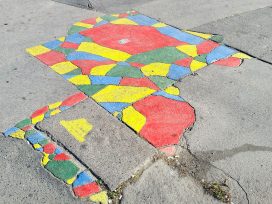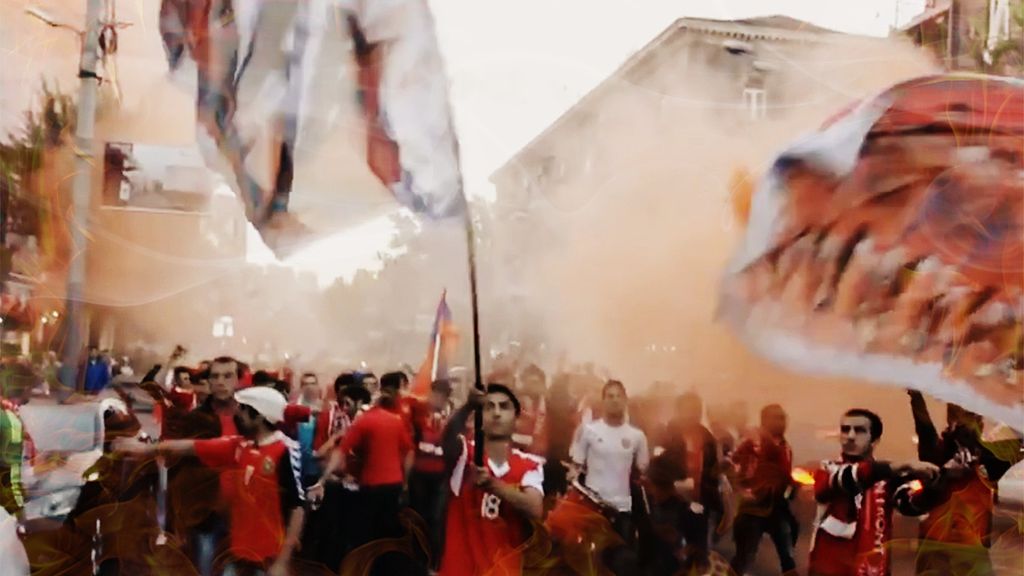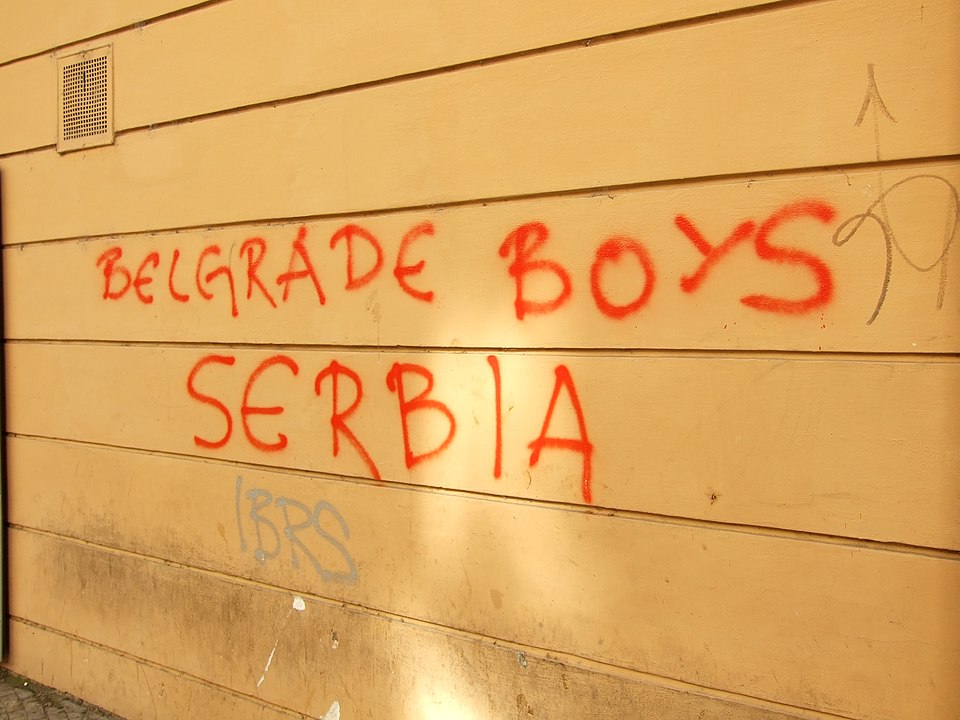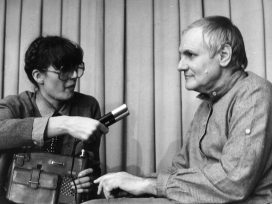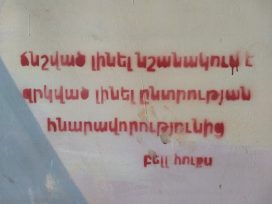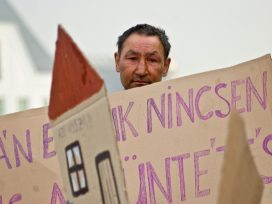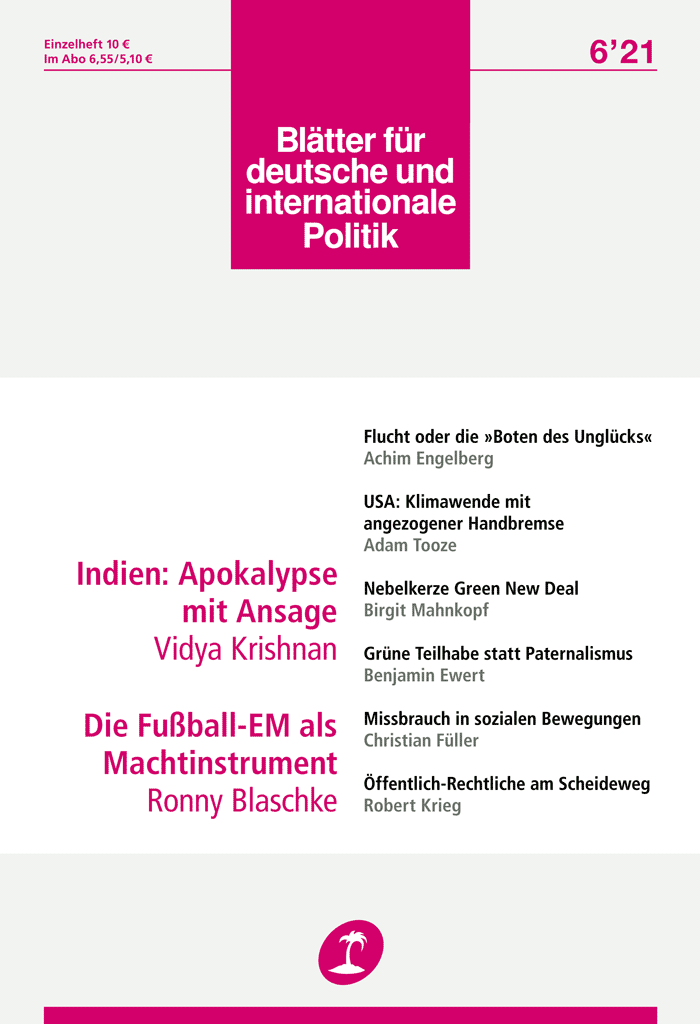
This article was originally published in Eurozine’s German partner journal Blätter, issue 6/2021.
When the 16th European Football Championship takes place between 11 June and 11 July, the European football association UEFA will mawkishly celebrate its continent-spanning tournament as a symbol of international understanding. UEFA has indeed come up with something very special for its 60th anniversary: for the first time in the history of the tournament, it will be held simultaneously in ten European cities and one in Asia.
The competition will be hailed everywhere for its diversity and human rights. However, this is only an ostentatious, superficial part of the picture. Behind the glittering facade of the multicultural football industry, the most popular sport in the world also acts as a handy instrument of power. Football provides an almost perfect showcase for autocrats, nationalists and separatists.
Take Hungary for example: three preliminary rounds and a knock out phase will take place in the capital Budapest – a marvellous political opportunity that Viktor Orbán will certainly not pass up.
Orbán’s football buy-out
Since taking office in 2010, Orbán has made a veritable pact with organized sports. His government finances the construction and renovation of stadiums, sports halls and training facilities. And Orbán personally encourages companies to invest in sport in return for tax breaks. In addition, leading Fidesz party members are now on the boards of major football clubs. Gábor Kubatov, who is both a member of the National Assembly and president of repeat champions Ferencváros Budapest, is one such example. This particular arrangement paid off for Orbán when Kubatov mobilized security guards from Ferencváros, including far-right football fans, against anti-government demonstrators.
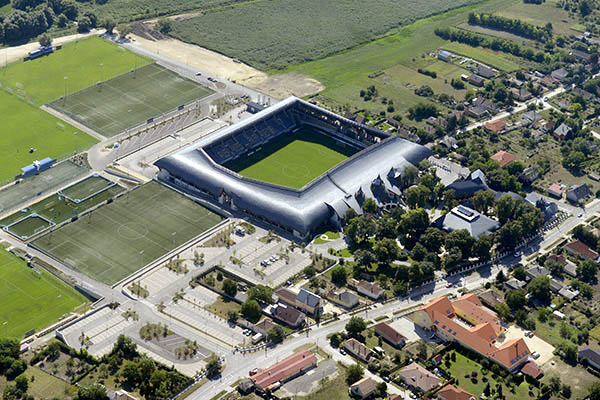
The Pancho Aréna with its capacity of over 3800 is built in the humble locality of Felcsút, a village of fewer than 1700 residents – the stadium is almost across the street from the home of Viktor Orbán. It is named after legendary footballer Ferenc Puskás, whose sizeable belly earned him the nickname ‘Pancho’, as he played for Real Madrid up until his late thirties. Photo by CivertanS at Hungarian Wikipedia, CC BY-SA 3.0, via Wikimedia Commons
In the EU, Viktor Orbán is seen as a nationalist outsider, but in football he can present himself as a great European. While Germany imposed stricter entry requirements at the beginning of the year due to the spread of the UK coronavirus variant, Hungary allowed foreign athletes to enter for sporting events. This made it possible for several European competition matches to be held in Budapest in March, despite a local case rate of over 300 daily deaths, the worst figure in Europe at the time.
Putin and football as propaganda
Viktor Orbán is following the sports policy model pioneered by Vladimir Putin. After the Soviet Union’s collapse and Boris Yeltsin’s turbulent years, Putin wanted to regain stability and international respect in the late 1990s. And, just as during the Cold War, albeit now in an expansionist capitalist way, sport serves as the perfect Russian propaganda tool.
Gradually, state institutions and enterprises – energy giants, banks and transport concerns – found their way into Russian football clubs. The world’s largest natural gas producer, the state enterprise Gazprom, played a leading role in bringing Putin’s hometown club, Zenit St. Petersburg, into the higher ranks of European sport. The firm also took up partnerships with FC Schalke 04 and Red Star Belgrade, as well as with UEFA and FIFA.
This political strategy is also at work in the Russian provinces, which are often in fierce competition with each other to attract tourists, professional workers and investments. More than a third of the 16 clubs in the Russian Premier League receive support from their local government administrations. This is a win-win situation: a club that is successful due to public investment in turn attracts investors favoured by elite sectors of the population.
The provinces have also benefited from successful major events that the Kremlin has recently brought to Russia. First and foremost, 2014 saw the Winter Olympics held in Sochi, but there has also been the 2011 Biathlon World Championships in Khanty-Mansiysk, the IAAF World Championships in Athletics held in Moscow in 2013, the 2015 Word Aquatics Championships in Kazan and the 2016 Ice Hockey World Championships in Moscow and St. Petersburg. The highlight was surely the Russia-hosted 2018 FIFA World Cup. The tournament ran without major scandals and brought one hundred or so often opposing ethnic groups together in the world’s largest country.
Due to the national triumphs it may yield, sport serves as social cement in Russia. It also allows Putin to repeatedly showcase himself as a cosmopolitan statesman while at the same time pursuing hard-core power politics. There are reasons why Putin is no longer a welcome guest at many political summits in Europe after Russian forces have annexed Crimea, invaded eastern Ukraine, fought alongside Bashar al-Assad in the Syrian civil war and interfered in US presidential elections. But seven European Championship games are slated to take place in St. Petersburg – a welcome platform for Putin as much as it is for Orbán in Budapest.
Erdoğan and football in the name of religion
Football can serve as a political symbol of power, even without a country’s leader needing to go to the stadium that often. Some heads of state even manage to integrate elements of religion. In Turkey, the secular values of the republic’s founder, Mustafa Kemal Atatürk, were once the guiding principle for the economic elite. However, since Recep Tayyip Erdoğan became prime minister and subsequently president, the country has taken a different course. The state has variously given lucrative construction contracts to Islamic-conservative companies for airports, roads, mosques and, notably, for almost thirty football stadiums.
Many of the stadiums were built in cities and districts where the ruling AKP party enjoys big majorities. Shops, local transport and sometimes entire districts have been built around these construction projects. Meanwhile, stadiums, once named after Atatürk or his comrades, are taking on new identities. The grounds in Istanbul’s Beşiktas district, for example, where the current government often comes in for much criticism, originally named after Ismet Inönü, Turkey’s second president, has been replaced by a stadium sporting a mobile phone company’s name.
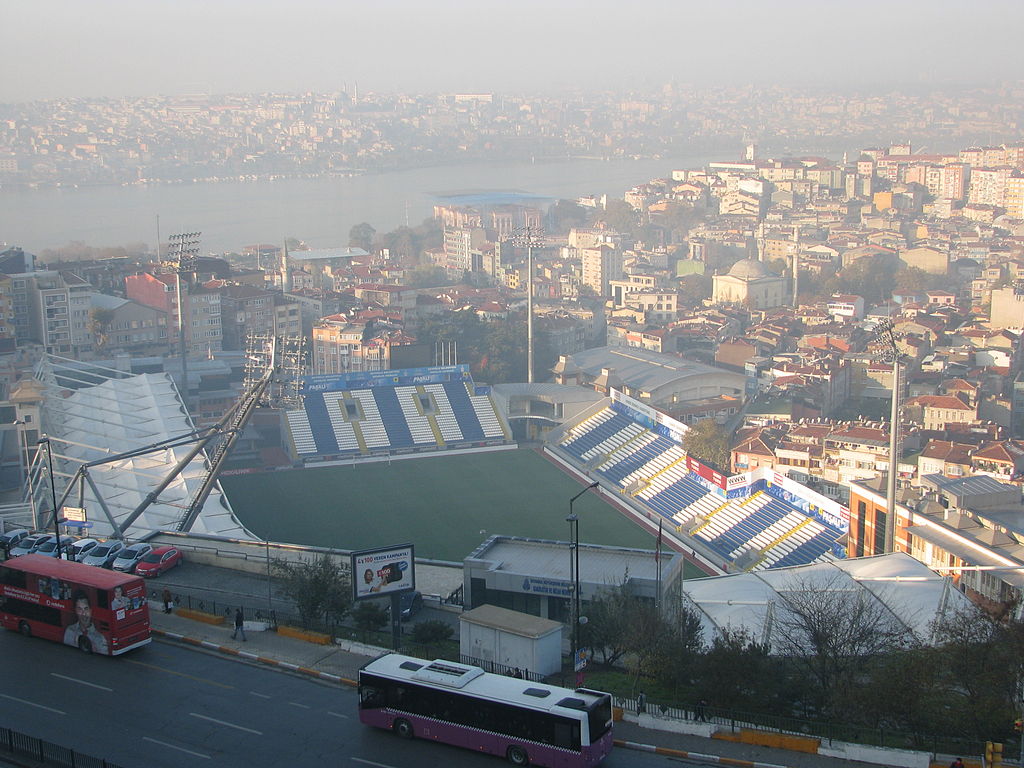
Recep Tayyip Erdoğan Stadium in Kasimpasa, Istanbul. Photo by Ex13, CC BY-SA 3.0, via Wikimedia Commons.
The stadium of Kasimpaşa, another Istanbul club, bears Erdoğan’s name. The president has demanded that stadiums should no longer be called ‘arenas’, a gesture expressing his desire to push against Western symbolism. In conservative areas such as Ankara and Konya, nationalist and Islamic chants are heard more and more in football stadiums.
Erdoğan is himself an outspoken Başakşehir supporter. The club, based in an Istanbul suburb, has close ties with the Ministry of Sports, the Turkish Football Federation and the media. Although Başakşehir has relatively few fans, the team became first-time Turkish champions in 2020 after its stadium was built in just 16 months. At the opening ceremony, Erdoğan led a celebrity side onto the pitch and scored three goals.
The Europeans in Asia
At the European Championships, the Turkish national team will play two preliminary matches in Baku, Azerbaijan, a key country allied with Turkey for Erdoğan. However, as recently as the autumn of last year, football was far from the first thing that came to mind when the region was mentioned. The Azerbaijani-Armenian war over the Nagorno-Karabakh region saw several thousands of people killed.
Football was a propaganda tool on both sides. In Baku, the club Zira held up a banner for Ilgar Bürcaliyev, the former youth player turned soldier who fell in battle. The stands were covered with Azerbaijani flags. Teams wore jerseys with the inscription ‘Karabakh is Azerbaijan’. Players saluted to the cameras and shared military videos on social media. ‘We must kill all Armenians,’ the press secretary for Azerbaijani champions Qarabağ wrote on Facebook. ‘Children, women, old people. We must kill them, with no exception.’
Azerbaijanis identify with Qarabağ. The club has its roots in Ağdam, once the largest city in Nagorno-Karabakh. During the disintegration of the Soviet Union, conflict over the territory turned into war. Armenia won and expelled almost all Azerbaijanis from the region. Ağdam was devastated and the Qarabağ team fled to Baku. There, they received political and financial support; the team has won seven championship titles in a row and participated in several European competitions.
The autocratic president of Azerbaijan, Ilham Aliyev, wants to make use of positive headlines from wins such as these to draw attention to his country’s oil and gas deposits. Similarly, Formula 1, which has been hosted in Baku every year since 2016, provides good visibility. In 2015 the first European Games were held in Baku. After long negotiations, athletes from Armenia were able to take part but had to do so under military protection. Henrikh Mkhitaryan, the captain of the Armenian national football team, often speaks out in his capacity as a National Goodwill ambassador for UNICEF. But he opted out of the 2019 Europa League final in Baku, fearing for his safety.
According to a special UEFA rule, clubs and national sides from Armenia and Azerbaijan are barred from playing one another. However, derisory songs and banners with hostile messages are often found at international games, often involving diasporic communities linked to either side. In Berlin and Vienna, fans of Turkish origin sometimes team up with Azerbaijanis against Armenians. And in Warsaw and Budapest, far-right groups show solidarity with Armenia.
A football association was founded in High Karabakh in 2012, but, because the region is not an independent state, it is denied membership to the global football association, FIFA. Instead, the association joined the Confederation of Independent Football Associations (CONIFA), which brings together teams from unrecognised states, minorities and regions. The first Secretary General of the Association worked for the Armenian Ministry of Foreign Affairs and, as a consequence, Nagorno-Karabakh hosted the second European championship of unrecognised states in 2019.
Bloody football in the Balkans
When calls for ethnically homogeneous states were building in ‘multi-ethnic’ Yugoslavia during the 1980s, stadiums became sites of nationalist chants and violence. Željko Ražnatović, a leading fan at Red Star Belgrade, had the same idea as politician Slobodan Milošević: the unification of all Serbs into a ‘Greater Serbia’. Ražnatović, calling himself Arkan, founded a paramilitary force made up of hundreds of football hooligans. After the end of state socialism and with the disintegration of Yugoslavia, ‘Arkan’s Tigers’ went to war, first against Croatian, then against Bosnian forces. They are considered responsible yet remain predominantly unprosecuted for countless murders and rapes, and effecting ethnic cleansing.
They also took part in the battle for Sarajevo, in which about 11,000 inhabitants were killed and over 50,000 were injured. In March 1992, Serbian units began to siege the Bosnian capital. They occupied a police academy near the Željezničar stadium, from where they shot at players and spectators during a match. For months, the stadium was on the front line. Militias dug in behind the clubhouse and the grandstands went up in flames. The Bosnian fans’ leader Dževad Begić Džilda was shot dead by a Serbian sniper whilst trying to save a woman who had been wounded.
The International Criminal Tribunal for former Yugoslavia indicted 161 people for serious crimes after the war, but thousands of perpetrators evaded justice. Ražnatović, who had an international arrest warrant out in his name, was shot in a hotel lobby in January 2000. Although the exact reasons for his death are unclear, Ražnatović had not been convicted. He is still a popular figure for many Serbs.
Serbian football fans also venerate General Ratko Mladić, who was responsible for the Srebrenica massacre in 1995, where 8,000 Bosnians were killed. Mladić may have been sentenced to life imprisonment in 2017, but Red Star Belgrade fans would shout out his name in tribute. Even players from the northern Serbian city of Novi Sad wore Mladić T-shirts.
In 2019 Belgrade fans parked a tank next to their stadium, which had been deployed during the Battle of Vukovar in Croatia in the early 1990s. The Serbian government seems to have made little objection to such a trivialization of war crimes. On the contrary, Aleksandar Vučić, Serbia’s president since 2017, likes to recall his past in the Red Star Belgrade fan scene.
Some Serbian football hooligans have risen to become entrepreneurs or serve on the security forces for political parties. It is thought that the Serbian secret service has set up a network of contacts in fan organizations with a view to preventing protests against the government. Many fan groups have supposed links to the mafia. On many occasions they have unfurled banners in the Kosovan capital Pristina that read ‘Kosovo is Serbia’.
When the Kosovo Albanian team FC Prishtina scored against Red Star Belgrade or Dinamo Zagreb, chants were raised against the Serbian-dominated Yugoslav government in retaliation. Although Kosovo declared independence from Serbia in 2008, Belgrade still regards its neighbour as a breakaway province. Nevertheless, FC Prishtina is one of the few Kosovar institutions that has received recognition throughout former Yugoslavia.
Sport has helped the country on its way to statehood and independence. Kosovars celebrated their admission to the International Olympic Committee (IOC) in 2014 as a real breakthrough. Enthusiasm was even greater in 2016, when Kosovo became a member of UEFA and FIFA.
After these successes, the Kosovar Football Association has intensified its search for talent throughout Europe. Officials have travelled to Germany, France and Switzerland to speak to players whose parents left Kosovo during the war. Thanks to these efforts, the Kosovo national team has earned a good reputation and narrowly missed qualifying for the European Championships.
More than 100,000 people applied for tickets to some home games in Pristina. Ninety percent of Kosovars are ethnic Albanians and, for many, the Albanian nation was once the only one that mattered. However, as the success of the Kosovo national team has grown, the number of Albanian flags in Pristina has decreased. Football plays an important role in what has been dubbed ‘nation branding’, the emergence of an independent national identity.
While 115 of the 193 UN member states recognize the Republic of Kosovo, other states have expressed their opposition. For example, football associations from Serbia, Russia and Bosnia and Herzegovina have formally indicated to UEFA that they do not want to play against Kosovo.
Spanish separatism and the role of football
The Spanish government, which has thus far not recognized Kosovo for fear of separatist imitators in Catalonia and the Basque Country, is taking a different approach. Ahead of the 2022 FIFA World Cup qualifying match between Spain and Kosovo, the Ministry of Culture in Madrid approached the Spanish broadcaster RTVE to assert that moderators and commentators should speak of a Kosovar team but not of a national side. The stadium announcer announced ‘hymns to the game’, without mention of nations or their anthems.
In the Basque Country, Athletic Bilbao has been considered a symbol of self-assertion for over 120 years. Former player José Antonio Aguirre became the first regional president of the Basque Country in 1936. He supported the establishment of a Basque national team, in part as a potential catalyst for secession from Spain. But the end of the Spanish Civil War in 1939 put a stop to such ideas. Franco suppressed regional traditions and banned foreign-sounding club names; Athletic Bilbao became Athlético Bilbao during his dictatorship from 1941 to 1974.
During these decades, many Basques developed a dislike for centralized power in Madrid. In 1976, shortly after Franco’s death, teams from Bilbao and San Sebastián met in the Basque Derby. Before kick-off, both captains demonstratively stuck the Basque Country flag in the centre of the pitch.
More than any other group, the EAJ-PNV, the most influential nationalist party in the Basque Country, has instrumentalized football in its politics. In 1977 PNV politician Jesús María Duñabeitia took over the presidency of Athletic Bilbao. Basque musicians began performing in the stadium again. More and more fans demanded political autonomy, which has contributed to some success: in Spain, Basque has been established as a nationality and elevated to an official language. New self-government rights have allowed the Basque Country to develop more than other regions of Spain.
However, Basque nationalism also has a murderous side: members of the underground separatist organization ETA (Euskadi Ta Askatasuna, Basque Homeland and Liberty) killed more than 800 people before it was disbanded in 2018. Football’s high public profile provided the ETA with prime targets. They kidnapped businessman Juan Pedro Guzmán, who was a member of the board of Athletic Bilbao, for several days in January 1986. The organization also sent extortion letters to wealthy Basques such as Bixente Lizarazu, who was born on the French side of the Basque Country and played for FC Bayern München.
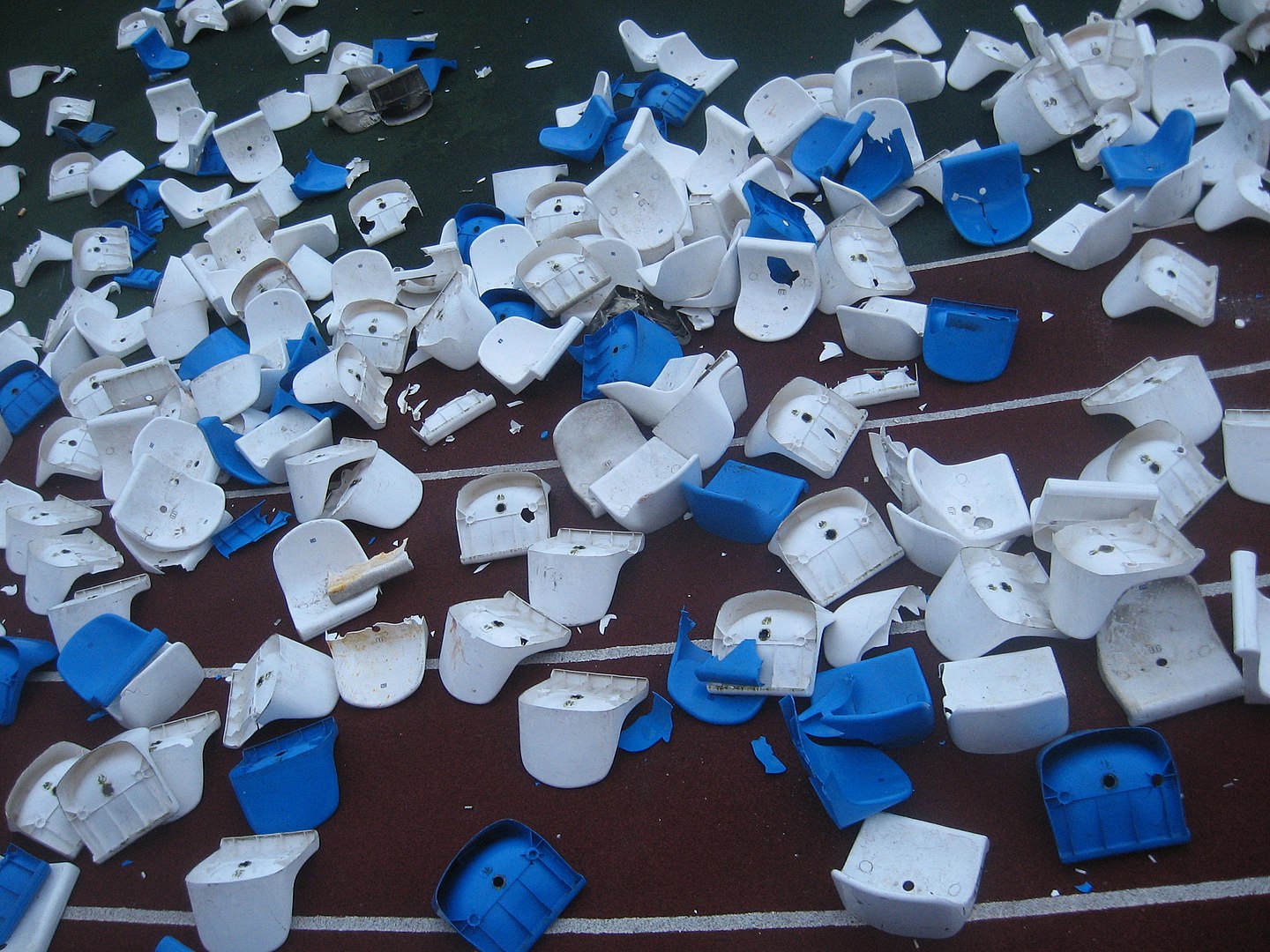
Plastic seats broken after soccer hooligans’ stadion visit in Bryansk, 2008. Photo by Zac allan, CC BY 3.0, via Wikimedia Commons.
The ETA never had more than a few hundred members, but it enjoyed tens of thousands of sympathizers. In the Bilbao stadium, fans demanded the release of imprisoned ETA members. And when Athletic held a minute’s silence in 2008 for the Basque social democrat Isaías Carrasco, murdered by the ETA, part of the audience disrupted the memorial by blowing whistles.
This pronounced nationalism also manifests itself in the team’s formation. For more than a hundred years, Athletic Bilbao had drawn exclusively on players with Basque biographies. Today, birthplace is no longer central, but players are required to have ‘grown up in Basque football’. However, such ‘rules’ for talent scouts are not written down in any statutes; the Spanish Constitutional Court would otherwise have comments to make.
Recent debates circle around the heritage of players and occasionally includes racism towards players of African descent. Iñaki Williams, born in Bilbao, son of a Ghanaian father and a Liberian mother, was the first black man to score a goal for Athletic in 2015 during the Europa League.
Many Athletic Bilbao fans do not want to have anything to do with the Spanish national team. In the Basque Country, television ratings for international games are often lower than in other regions. Originally, the Spanish team was supposed to play its three preliminary Euro 2020 rounds at the San Mamés stadium in Bilbao. But Bilbao did not want to guarantee admission for spectators during the pandemic. UEFA consequently moved the games to Seville and many local fans were delighted that the Basque country had been ‘spared’ a visit from the Spanish national team.
Such a rejection is rather unlikely in other host cities of the European Championship. Orbán, Putin and Erdoğan will even exploit their football teams and games for national purposes. Try not to be taken in by the much-trumpeted commitment to human rights and a multicultural society – at this European Championship, many organizers will be putting their own nationalism first.
